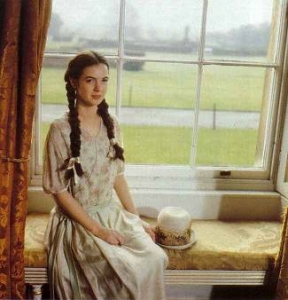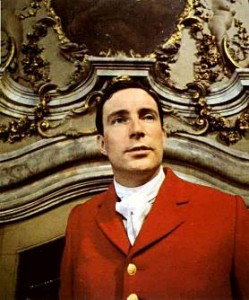 Consider Cordelia. Her faith is just as certain as Bridey’s, but it is faith from the heart and faith in action.
Consider Cordelia. Her faith is just as certain as Bridey’s, but it is faith from the heart and faith in action.What are Cordelia’s virtues? She not only has a sense of humor, she has a sense of humor about her faith: nice touch calling her pig ‘Francis Xavier’ She also has a down to earth piety with no time for frippery or sentimentality or spiritual blackmail: “I don’t think Our Lady cares two hoots whether my gym shoes are straight under my bed.”
She is honest and hates humbug. She speaks bluntly about Sebastian’s drinking when everyone else is hushing it up. She speaks openly about everything, but does so in charity–never with malice. When her father, on his deathbed, asks about his adultery and abdication, “Was that a crime?” She says, “I think it was Papa”, and it is this cutting truth which prompts his final repentance.
She has natural charity: witness her ‘little black Cordelias’ and her eventual pro active involvement as a nurse in the war.
She suffers in silence. Of course she wanted a coming out ball at Marchmain House, but that was ruined by her father’s indolence, pride and lust. Of course she wanted to be a nun, but she didn’t have a religious vocation. Of course she wanted a husband and family, but she was plain and not glamorous.
She is not self righteous. Consider how her reaction to Charles and Julia’s adulterous relationship contrasts to Bridey’s. Bridey says that Beryl Muspratt would not consider spending the night under the same roof as Julia and Charles and Rex. While decorous and correct, Bridey’s stance is self righteous and condemnatory. Cordelia never condones, but never condemns. She merely says to Charles, “You and Julia?” and allows him to draw his own conclusions.
She has enthusiasm. She has joy. She has trust. She has faith. She believes the best and is hurt by the worst.
Cordelia is the one who makes the faith attractive to Charles. He like her from the start, and is amused and intrigued by her faith. He is impressed with her selfless service in the war, and her courage in facing her life’s difficulties. He is attracted to her innocence, her passion and her charm–admitting that she is ‘enchanting.’ Waugh paints a portrait of a genuine, deep down, beautiful Catholic character.
Most of all, Cordelia exhibits love. She loves, she loves Sebastian, she loves Bridey, she loves Lady Marchmain, she loves herself properly, she loves Nanny Hawkins, she loves Julia and Charles, and Marchmain House, and Brideshead and North Africa, and the monks and the convent: in short she loves life and love and all things.











